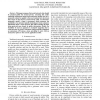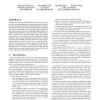74 search results - page 1 / 15 » k-symmetry model for identity anonymization in social networ... |
EDBT
2010
ACM
13 years 8 months ago
2010
ACM
With more and more social network data being released, protecting the sensitive information within social networks from leakage has become an important concern of publishers. Adve...
DASFAA
2011
IEEE
13 years 2 months ago
2011
IEEE
\Identity disclosure" problem on publishing social network data has gained intensive focus from academia. Existing k-anonymization algorithms on social network may result in n...
CHI
2003
ACM
14 years 5 months ago
2003
ACM
In this paper, we describe the identity policy decisions for a community network outside of Boston, Massachusetts. To promote trust and accountability, a member's online iden...
SOCIALCOM
2010
13 years 2 months ago
2010
This paper proposes that social network data should be assumed public but treated private. Assuming this rather confusing requirement means that anonymity models such as kanonymity...
COMSNETS
2012
12 years 9 days ago
2012
Anonymity is one of the main virtues of the Internet, as it protects privacy and enables users to express opinions more freely. However, anonymity hinders the assessment of the ve...


